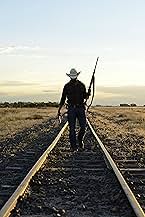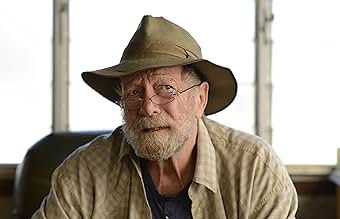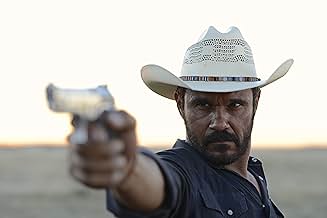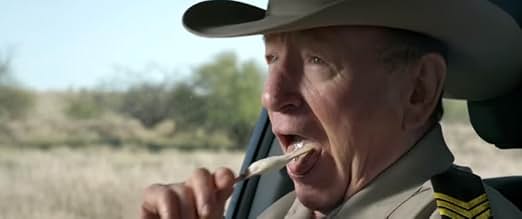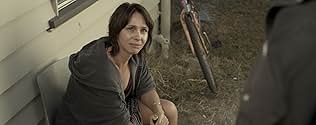An indigenous detective returns to the Outback to investigate the murder of a young girl.An indigenous detective returns to the Outback to investigate the murder of a young girl.An indigenous detective returns to the Outback to investigate the murder of a young girl.
- Awards
- 9 wins & 16 nominations total
- Director
- Writer
- All cast & crew
- Production, box office & more at IMDbPro
Featured reviews
The first scene sets up the whole film most deftly: its depiction of the magnitude of the land at sunset coupled with the place name, Massacre Creek, instantly makes it clear that the vastness of the Australian terrain and inglorious, largely unrepented historic events will frame what follows.
Aaron Pedersen plays the police detective Jay Swan, an Aboriginal returning from 'the city' to his small and extremely isolated home town after a 10 year absence. He is estranged from his former wife, now an alcoholic making a hash of raising their daughter, and also the community in which he was raised. Not fully accepted by the white community either, he is the classic outsider forced to go it alone.
Swan is assigned to the case of a murdered Aboriginal teenage girl whose body is found in a state of some decay quite some time after her violent end. It probably won't come as a great shock to find that the rest of the local constabulary, all white and male, are not only indifferent to the crime but hostile to its investigation, impeding Swan at every juncture. As Swan battles on uncovering corruption, drug dealing and civic sanctioned child prostitution, he starts to shed light on the town's inherent racism and misogyny – there appears to be no one in the town of any authority who is either black or female.
The film is a modern twist on the western genre: the lone lawman coming to town quietly determined to see right is done. It is the sort of role Gary Cooper, John Wayne and Jimmy Stewart all handled with ease 60 years ago. Aaron Pedersen is a worthy successor to these Hollywood greats, compelling in his restrained performance, giving just a hint of the angst beneath his calm exterior but always in control of himself. In the main, the supporting cast is also strong – especially Hugo Weaving as a police officer of dubious integrity and an alluded to murky past.
Like all classic westerns the film's denouement is a good old-fashioned shoot-out. This extended scene is particularly well handled by Sen with tight direction and camera work – although his cinematography throughout the film is praiseworthy.
The film has a few flaws. Early scene dialogue giving the backstory is rather stilted – though this quickly settled down; the minor character of a buffoonish local newspaper reporter was both unconvincing and irrelevant – it was as if Sen felt, wrongly, that his film needed a little comic relief. And I was surprised at the amount of drugs uncovered in such a very small town. I'm no expert but I'd have thought the quantity shown would be enough to supply the whole of Melbourne – including its nearby rock festivals – for a year.
Ultimately, many of the film's plot strands were left hanging which was, ostensibly, rather untidy. But on this, I'm giving Ivan Sen the benefit of the doubt. There was no neat resolution to his film or the crimes it depicts, because there is, as yet, no resolution to the social issues he raised in a non-preachy manner.
From the opening until the dramatic end, the movie is a captivating tour de force. Coming from the U.S. I'm completely ignorant of the racial biases apparently at play in the Australian Outback, and this film subtly puts them on display without having them become overbearing or preachy.
The acting is tops and Aaron Pederson does his subject well, playing him with confidence and understatement. Hugo Weaving's turn as Johnno is also a well-crafted part, not to mention all of the minor roles, all of which came across as completely believable. It's easy to say the Australian landscape had just as large a role as any of the cast, and it read its lines perfectly.
Although there were a few parts where I found it difficult to understand what was said as a result of the local accent, there was no missing the message that was delivered. Again, from beginning to end the movie hit all the right notes, and even its climatic ending delivered a superbly satisfying denouement to the whole.
I've come to appreciate films not produced in the U.S. because they all too often are so formulaic with shallowly cast characters. Mystery Road represents among the best of what I look for in a movie produced anywhere and is tops among such "foreign" films. It is definitely one to catch.
So how did it get me? I guess because it struck me as believable - the characters, the places, the story. Having visited the edge of the Auz outback I fully related to the backgrounds and the characters. The texture and feel of the presentation struck me as the genuine article. I have said it before about top quality film directing - that the feel was more like a documentary with real people and not actors.
The acting was excellent but not of a fine silken quality or in any way slick. Rather the characters were raw and gritty, which could explain some review comments suggesting wooden or poor acting.
This movie felt like a fly on the wall view of the hard side of a tough life in the Australian outback, replete with huge social problems, racism, and defeated and depressed people tying to survive while drugs and crime were eating into the life of the area.
As depressing as was the setting, funny enough, I was not in the least depressed by the movie. There was a strong ethical line and I felt throughout that good would make it in the end.
This is a great movie without any big name actors, without fancy settings, without a great musical score, without great special effects, without bells or whistles of any description. It is totally minimalist art. It's greatness is in the excellent direction, the acting, the cinematography, and a decent enough plot.
Did you know
- TriviaMuch of this film is shot in the small Australian town of Winton. Mystery Road held its first screening there. Some of iconic Australian film, Crocodile Dundee, was shot there (The Walkabout Creek Pub Scene).
- GoofsWhen the detective pulls up to Mary's house, she is watering the lawn with a hose. But when Mary calls Crystal to come out, she no longer has the hose and it isn't on the ground when the scene widens. When Crystal walks over to the detective's car, Mary once again has hose in hand, watering.
- Quotes
[first lines]
Detective Jay Swan: [waking to answer the phone] Yeah? Alright. OK...
[rolls out of bed]
Robbo: [greeting his arrival on scene] Jay...
Detective Jay Swan: G'day, Robbo. What's the story?
Robbo: The truckie pulled up to check his trailers, heard a wild dog growling from under the bridge, smelt something rotten.
Detective Jay Swan: How did he know it was a wild dog?
Robbo: Guess he just knows the difference, I suppose. You know, between a wild dog and a wild kind of normal dog.
- How long is Mystery Road?Powered by Alexa
Details
Box office
- Budget
- A$3,000,000 (estimated)
- Gross worldwide
- $280,702




